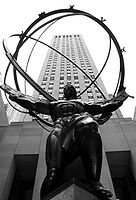- David Kelley
-
This article is about the American philosopher and writer. For other people of the same name, see David Kelley (disambiguation).
David Kelley (born June 23, 1949 in Shaker Heights, Ohio) is an American philosopher, author, and advocate of Objectivism. He is founder and senior fellow of The Atlas Society. He lives in Washington, D.C..
Contents
Education and career
Objectivist movement  OrganizationsTheoristsLiteratureCapitalism: The Unknown Ideal
OrganizationsTheoristsLiteratureCapitalism: The Unknown Ideal
For the New Intellectual
The New Left
Philosophy: Who Needs It
The Romantic Manifesto
The Virtue of Selfishness
The Voice of Reason
Objectivist periodicals
Journal of Ayn Rand StudiesPhilosophy portal Kelley is trained as a philosopher. He received his BA and MA in philosophy from Brown University, where he studied with the American rationalist, Roderick Chisholm. He received his Ph.D. in 1975 from Princeton University, where his advisor was the American postmodernist Richard Rorty. He was an assistant professor of philosophy and cognitive science for 7 years at Vassar College.[1] He then taught logic for a brief time at Brandeis University, while working as a freelance writer for Barron's Magazine and other publications.
A member of her circle, David Kelley read Ayn Rand's favorite poem, "If—", by Rudyard Kipling, at her funeral in 1982.[2]
Objectivism's 'open' faction
Leonard Peikoff's Ayn Rand Institute (ARI) declared Objectivism to be a "closed system" containing only the philosophic principles advocated by Rand herself.
In 1989, Kelley set out in a pamphlet his critique of the ARI Objectivist movement. The pamphlet was titled "Truth and Toleration" (later republished in an expanded edition as the book The Contested Legacy of Ayn Rand). Kelley declared Objectivism to be an "open system" amenable to revision and addition. He held that cognitive error can result from many factors and need not involve moral culpability (something with which both Rand and Peikoff also agreed). This "critique" subsequently split the movement into two factions. Kelley founding the Institute for Objectivist Studies (now The Atlas Society), a non-profit dedicated to cultural advocacy on behalf of "reason, individualism, achievement, and capitalism."
In 1990 he founded the Institute for Objectivist Studies (IOS).[3] IOS was established to provide an Objectivist alternative to the Ayn Rand Institute, founded by Leonard Peikoff. IOS sponsored scholarly work on Objectivism and conducted summer workshops attended by academics and graduate students. In 1999 IOS was renamed The Objectivist Center (TOC), as the organization took on a more public-outreach and advocacy orientation.
Scholarly work
In order to pursue his scholarly interests, Kelley stepped down as executive director of TOC in 2004, and the organization – now under the leadership of former regulatory policy analyst Edward Hudgins – was again renamed as The Atlas Society (TAS). TAS also moved its headquarters from Poughkeepsie, N.Y., to Washington, D.C. The organization continues to sponsor scholarly work,[4] publishes a website[5] and a political-cultural magazine,[6] and puts on conferences and seminars[7] where scholars and fans of Rand's work meet and mingle. Kelley reassumed the position of executive director for TAS in 2008.
Kelley's books cover a variety of subjects within philosophy. They include [8]The Evidence of the Senses, which argues for a unique form of direct realism about perception; Unrugged Individualism, which explores benevolence as a virtue; A Life of One's Own, a moral critique of the welfare state; and The Contested Legacy of Ayn Rand,[9] focusing on the schisms within the Objectivist movement. With Roger Donway, he co-authored Laissez Parler: Freedom in the Electronic Media, a critique of government regulation of broadcasting.
Kelley has not published any new scholarly work in philosophy since 1998, though he has given public addresses, taught courses, and has written articles on politics and current events. An ongoing research and writing project over the past decade has been his magnum opus, The Logical Structure of Objectivism, which he is co-authoring with economist William Thomas.
Currently, Kelley is also actively involved as a script consultant for Atlas Shrugged: Part I, the film version of Atlas Shrugged, which was released by independent film group The Strike Productions.
Works
- The Evidence of the Senses: A Realist Theory of Perception (1986) Louisiana State University Press (based on his Princeton PhD dissertation) ISBN 0-8071-1476-6
- A Theory of Abstraction (full text; ISBN 15-7724-062-6) (2001) The Objectivist Center. Originally published in Cognition and Brain Theory, 1984, v. 7 (3 & 4), pp. 329–357.
- Evidence and Justification (full text; ISBN 15-7724-019-7) (1998) The Institute for Objectivist Studies. Originally published in Reason Papers: A Journal of Interdisciplinary Normative Studies, vol. 16, 1991, pp. 165-79.
- The Art of Reasoning (1988) ISBN 0-393-97213-5. Originally published in 1998 by W. W. Norton, it is currently in its third edition, and has been well received.[1]
- Unrugged Individualism: The Selfish Basis of Benevolence (1996, rev 2nd ed 2003) ISBN 15-7724-066-9
- A Life of One's Own: Individual Rights and the Welfare State (1998) ISBN 1-882577-71-X
- The Contested Legacy of Ayn Rand: Truth and Toleration in Objectivism (2e full text; ISBN 07-6580-060-8 and ISBN 15-7724-010-3) (1990, exp 2e 2000)
See also
- American philosophy
- List of American philosophers
References
- ^ Vassar College (1982). Vassar College Catalogue. Poughkeepsie: Vassar College.
- ^ Heller, Anne C. (2009). Ayn Rand and the World She Made. New York: Doubleday. p. 410.
- ^ "February 24 is the 20th Anniversary of the Founding of The Atlas Society". The Atlas Society. http://www.atlassociety.org/objectivist-movement. Retrieved 2010-02-23.
- ^ http://www.atlassociety.org/objectivism_research
- ^ http://www.atlassociety.org
- ^ The New Individualist
- ^ http://www.atlassociety.org/objectivism_student_resources
- ^ http://www.atlassociety.org/objectivism_research
- ^ http://www.atlassociety.org/sites/default/files/The_Contested_Legacy_of_Ayn_Rand.pdf
External links
- The Atlas Society
- Publications by David Kelley at The Objectivism Store
- The David Kelley Corner at Objectivist Living
- Curriculum Vitae
- The Party of Modernity Western Liberalism vs. Post-Modernism and Pre-Modernism (November 2003)
Categories:- 1949 births
- American philosophers
- Living people
- Objectivism scholars
- Objectivists
Wikimedia Foundation. 2010.
